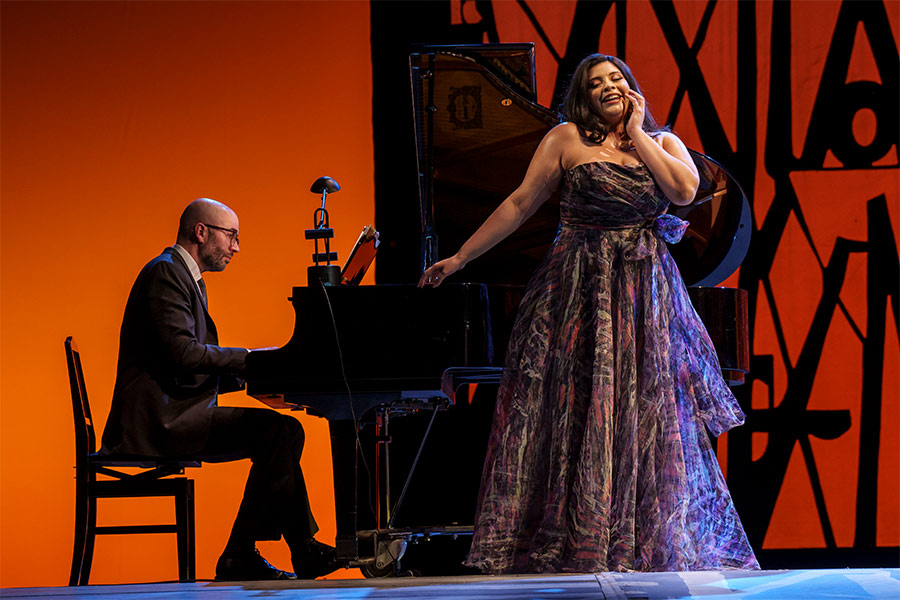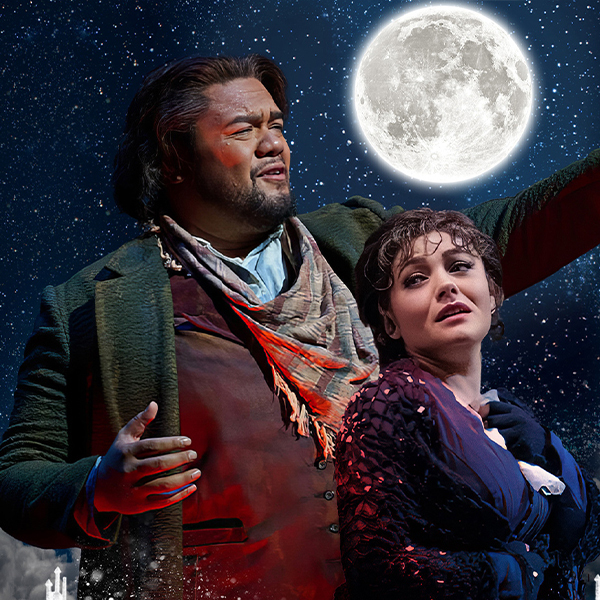July 01, 2024
Q&A with Gabriella Reyes
Rising star soprano Gabriella Reyes, celebrated for her “firm” and “lusciously coloured” voice by Opera News, continues to enchant audiences worldwide. With roles ranging from the spirited Musetta in La Bohème to the powerful High Priestess in Aida, Gabriella has established herself as a compelling presence on the operatic stage. In this exclusive Q&A, she delves into her evolving portrayal of Musetta, her heartfelt connection with Chicago audiences, and the joys and challenges of switching between the complex characters of Musetta and Mimì. Her reflections reveal a profound understanding of her craft and the intense emotions that fuel her performances. Whether discussing her favorite moments on stage or balancing the demands of a dynamic career, Gabriella's passion and dedication to opera are unmistakable. Join us as we explore the thoughts and experiences of this extraordinary artist, who continues to ascend to even greater heights in her remarkable journey.
What have you learned about playing Musetta over the years? How has your approach to this character evolved since you first started?
Society often pits women against each other, comparing us to see who is the better model of femininity. When I first sang in La Bohème as Musetta, I viewed Musetta and Mimi as opposites. However, after singing Mimi, I’ve learned that Musetta and Mimi are two sides of the same woman. They share similar struggles in a world where they must take control of their lives to survive and make something of themselves. Musetta achieves this through her independence and social influence, securing her survival at a time when women were discouraged from doing so. I've grown to have more compassion for Musetta's choices and admire her for them.
You made your Lyric debut in Florencia en el Amazonas in the 2021/22 Season. How does it feel to be back in Chicago?
The 2021/22 Season provided me with a unique experience of Chicago. Florencia en el Amazonas was the first full production I performed after COVID-19 shut down the world. I feel very honored to be invited back to Chicago, as it’s one of my favorite houses to sing in!
Now that you have one show under your belt at the Lyric, does performing here feel any different? Is it more or less intimidating or exciting?
Every performance brings its own excitement and nerves, but there's a warmth I feel in knowing that Chicago audiences support me and appreciate what I have to offer. They always show up ready to cheer us on, and now that I've experienced it, I eagerly look forward to performing for them again!
You have sung both Musetta and Mimì in La Bohème — do you have a favorite role? Do you ever find it difficult switching between the two characters?
As I mentioned earlier, Musetta and Mimi are two sides of the same woman. I can't say I have a favorite because my understanding of Mimi is deeply connected to having lived in Musetta’s shoes. Likewise, if I hadn't sung Musetta, my portrayal of Mimi would probably be different. The main challenge is wanting to sing the other character’s beautiful lines when performing one role, but beyond that, I appreciate switching between them, as it allows me to experience womanhood through different lenses.

Gabriella Reyes performs selections from Puccini's La Bohème with pianist Jerad Mosbey at Lyric's 2024/25 Season Launch event.
What is your favorite moment in the opera and why?
My favorite moment in the opera is the couples’ quarrels in the Act 3 quartet. It always impresses me how Giacomo Puccini set Luigi Illica’s and Giuseppe Giacosa’s text into an interwoven masterpiece. The declamations between Marcello and Musetta burst out like fireworks, contrasting with the legato, romantic, and heartfelt breakup of Rodolfo and Mimi. It’s wonderful theater.
Have you previously performed with any of your fellow cast members before this production of La Bohème? Given that La Bohème relies heavily on the dynamics and friendships among the cast, how does this influence your rehearsals and interpretation of your roles?
The most exciting part of this production is that I've previously performed with most of the cast and team, and I'm close friends with many of them. It's rare to work with colleagues you deeply admire. I’m particularly proud of my collaboration with our director, Melanie Bacaling. We met during our Intro to Opera course at Boston Conservatory and have often dissected roles and personal relationships together. With our shared experience, I look forward to deepening my understanding of Bohème with her at the helm. Ailyn Perez — whom I've admired for years — and I recently performed Florencia en el Amazonas at the Metropolitan Opera in one of the most moving productions I've ever been part of. Our real-life friendship will significantly influence the sisterhood between Mimi and Musetta, especially in Act 4. With Will Liverman, Pene Pati, Peixin Chen, and Jordan De Sousa, I anticipate our rehearsals will be filled with laughter!
As a busy performer, how do you balance the demands of your career with personal growth and maintaining your vocal health?
As artists, the work is never truly finished. While on contract for one gig, I often use my off time to learn upcoming repertoire, translate, memorize texts, or even coach and sing through other roles. However, I firmly believe that taking time to completely switch off is crucial, not just for vocal health but for mental health too. We are sensitive, organic beings who need time to rest and recharge to continue creating.
What do you believe is the main message or take away from La Bohème — for both artists and audiences?
The main takeaway from La Bohème is to cherish your friendships and relationships. Time is fleeting, and being present with your loved ones is paramount. In our post-COVID-19 world, we understand that sickness can affect anyone, so it's best to hold on to your loved ones dearly while you can.

